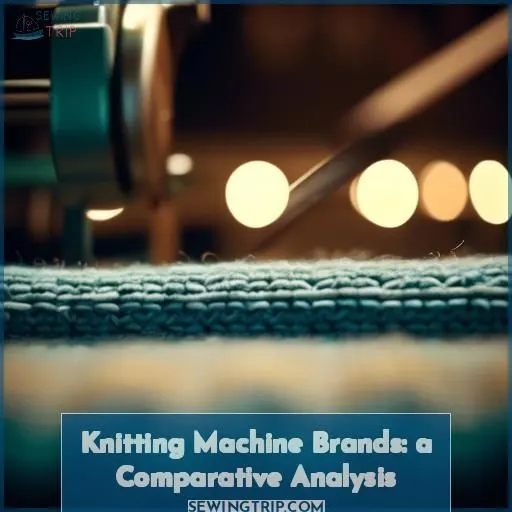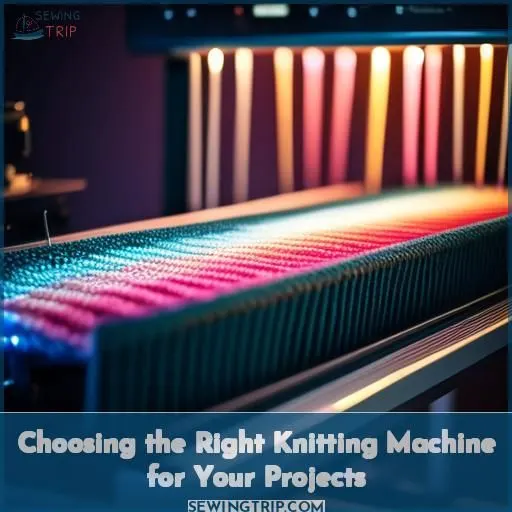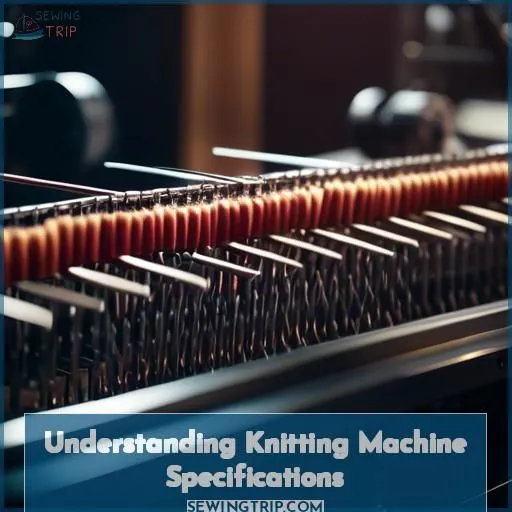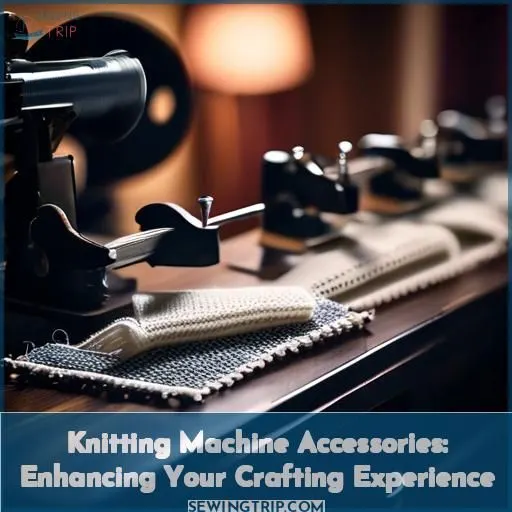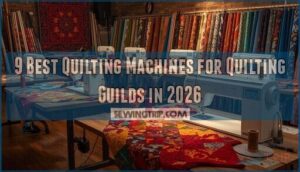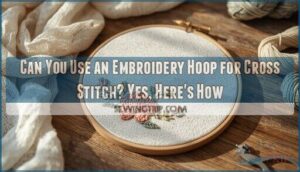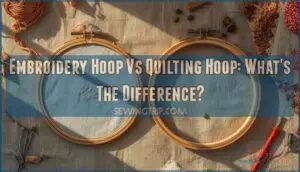This site is supported by our readers. We may earn a commission, at no cost to you, if you purchase through links.

Our expert-curated guide unveils the top 10 trusted brands.
It equips you with insights to make an informed decision.
Explore comprehensive reviews that delve into critical factors like functionality, versatility, and user-friendliness.
Elevate your crafting prowess with our meticulously researched recommendations tailored to your knitting aspirations.
Table Of Contents
Key Takeaways
- The top 10 trusted knitting machine brands include Silver Reed, Brother, and Knitmaster, each offering a range of machines for different knitters.
- Factors to consider when choosing a knitting machine include needle size, yarn weight, fabric swatches, project planning, and cost comparison.
- Knitting machines have various specifications, such as yarn compatibility, stitch selection, and tension adjustment, which can impact the quality of your knitted items.
- Accessories like ergonomic designs, machine maintenance tips, and troubleshooting tools can enhance your knitting experience and help you maintain your machine.
Knitting Machine Brands: a Comparative Analysis
When it comes to knitting machines, the brands you choose can significantly impact your experience. The world of knitting machines isn’t only complex but ever-evolving, with new features and improvements constantly being introduced. To make an informed decision, it’s essential to understand the knitting needle size, yarn weight, fabric swatches, project planning, cost comparison, and other factors that can influence your choice.
In the realm of knitting machines, there are several brands that stand out for their quality, ease of use, and versatility. These brands include Silver Reed, Brother, and Knitmaster. Each of these brands offers a range of machines designed to meet the needs of different knitters, from beginners to experienced crafters.
Silver Reed machines are known for their durability and ease of use. They’re Japanese-made and have been distributed under various names, such as Singer, Studio, Empisal, and KnitMaster. Silver Reed machines are relatively easy to set up and use, making them a great choice for those new to the world of knitting machines. Used Silver Reed machines are also readily available, although parts for some of the older models may be difficult to obtain.
Brother machines are another popular choice, offering a range of features and accessories. They’re known for their versatility, with some models capable of creating purl stitches and being compatible with software like DesignaKnit. Brother machines are also popular in the UK, with many second-hand machines available due to their popularity.
Knitmaster/Silver Reed machines use levers on the carriage, while Brother machines use buttons. Knitmaster/Silver Reed parts are more easily available, and old accessories work on newer machines. Brother machines have different types of accessories, but they’re more popular in the UK, so there are more second-hand machines available.
When comparing these brands, it’s essential to consider factors such as knitting needle size, yarn weight, fabric swatches, project planning, and cost comparison. Each brand offers a range of machines with varying specifications, so it’s crucial to choose the one that best suits your needs and budget.
In conclusion, when it comes to knitting machine brands, it’s not merely about choosing the most popular or well-known brand. It’s about finding the one that’s designed to enhance your crafting experience, whether you’re a beginner or an experienced knitter. By considering factors such as needle size, yarn weight, and ease of use, you can make an informed decision and find the best knitting machine for your projects.
Choosing the Right Knitting Machine for Your Projects
When it comes to knitting machines, there are numerous types to choose from, each with its own unique features and capabilities.
- Yarn compatibility: Different knitting machines are designed to work with various types of yarn, such as hand yarns, ribbons, or novelty yarns. Ensure the machine you choose can handle the yarn you plan to use.
- Project complexity: Some knitting machines are better suited for simple designs, while others excel in creating intricate patterns. Consider the complexity of your projects and choose a machine that can handle the desired level of detail.
- Learning curve: If you’re new to knitting machines, opt for a machine with a simpler learning curve that’s easy to operate. More complex machines may require additional time and effort to master.
- Budget considerations: Knitting machines range in price, from entry-level models to more advanced machines. Determine your budget and choose a machine that offers the best value for your needs.
Expert reviews and trusted brands, such as those found on DoYouSew, can provide valuable insights and recommendations when selecting a knitting machine for your projects. By considering these factors and conducting thorough research, you can find the right knitting machine to bring your knitting dreams to life.
Understanding Knitting Machine Specifications
As you delve deeper into the world of knitting machines, you’ll find that understanding the specifications is crucial for achieving the best results. These machines come with a variety of features that can make or break your knitting experience. Let’s explore some of the key specifications that you should be aware of.
Firstly, consider the knitting needles. These are the tools that hold the yarn and create the stitches. Different machines may have different needle types, and it’s essential to choose one that suits your project. For instance, some machines may have interchangeable needles, allowing you to switch between different sizes and types for versatility.
Next, think about yarn compatibility. Different machines can handle different types and weights of yarn. Make sure to choose a machine that can handle the yarn you plan to use, as incompatible yarns can lead to poor stitch quality or even damage the machine.
Tension adjustment is another important factor. This feature allows you to control the tightness of your stitches, which can significantly impact the appearance and durability of your knitted items. Look for machines with adjustable tension settings that allow you to fine-tune your stitches to your desired level.
Carriage speed is also worth considering. This refers to how quickly the carriage (the part of the machine that holds the needles) moves. Faster carriage speeds can be beneficial for larger projects, as they allow you to work through the fabric more quickly. However, slower speeds may be preferable for smaller, more intricate projects that require more precision.
Stitch selection is another key specification. Different machines offer various stitch options, from basic stitches like stockinette and ribbing to more complex patterns like lace and cables. Consider the types of stitches you plan to use and choose a machine that can handle them.
Finally, expert reviews can provide valuable insights into the performance of different machines. Look for reviews from knitting enthusiasts and professionals who’ve used the machines you’re considering. These reviews can help you understand the strengths and weaknesses of each machine and make an informed decision.
In conclusion, understanding the specifications of your knitting machine is essential for achieving the best results. By considering factors like knitting needles, yarn compatibility, tension adjustment, carriage speed, stitch selection, and expert reviews, you can choose a machine that suits your needs and enhances your knitting experience.
Knitting Machine Accessories: Enhancing Your Crafting Experience
Accessories for knitting machines can significantly enhance your crafting experience.
- Ergonomic designs: Look for accessories that are designed to reduce strain and fatigue, such as adjustable foot pedals, padded knitting machine seats, and ergonomic needle holders. These tools can help you maintain a comfortable posture while knitting, allowing you to work for longer periods without experiencing discomfort.
- Machine maintenance tips: Regular maintenance is crucial for keeping your knitting machine in top shape. Accessories like cleaning brushes, oil bottles, and needle cleaners can help you keep your machine clean and well-maintained. Additionally, consider investing in a machine maintenance DVD or book that provides detailed instructions on how to clean and maintain your knitting machine.
- Troubleshooting common issues: Every knitter encounters issues with their machine at some point. Accessories like needle pusher tools, spare e-clips for tuck brushes, and JIS screwdrivers can help you fix common problems quickly and efficiently. A repair manual or guide can also be a valuable resource for troubleshooting and resolving more complex issues.
Advanced techniques with accessories can unlock the full potential of your knitting machine. For example, using a needle pusher tool can help you remove needles more easily, while a sponge bar cleaner can ensure your needles are always clean and ready for use. By investing in these accessories, you can enhance your knitting experience and create high-quality, consistent stitches.
Frequently Asked Questions (FAQs)
How to maintain and clean knitting machines?
You’ll need to regularly brush out any lint and fibers. Use a small vacuum or compressed air to clear debris from hard-to-reach areas. Wipe down surfaces with a dry microfiber cloth.
Can knitting machines create cable stitches?
Like a skilled artisan weaving intricate patterns, knitting machines deftly create cable stitches, bringing depth and texture to your garments.
Are knitting machine patterns interchangeable?
Nope, patterns aren’t interchangeable between knitting machines. You’ll need to find patterns designed for your specific model.
What is the lifespan of a knitting machine?
Knitting machines can last decades with proper care! Cleverly cared for, consistently cleaned machines continue cranking consistently captivating creations. Proper maintenance preserves pristine performance, prolonging your knitting companion’s lifetime.
Do knitting machines require special yarns?
You don’t necessarily need special yarns, but some machines work better with certain fibers and plies. Do some research to match the right yarn weight and material to your knitting machine.
Conclusion
After exploring the top 10 knitting machines recommended by experts, you’re well-equipped to make a savvy purchase. Don’t let this golden opportunity slip through your fingers; these unbiased reviews illuminate the best brands for your knitting aspirations. Whether a seasoned pro or budding crafter, you’ll find a top-notch machine to elevate your projects with versatility and user-friendliness.

